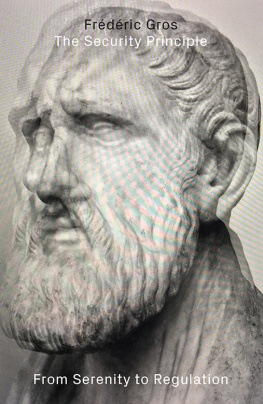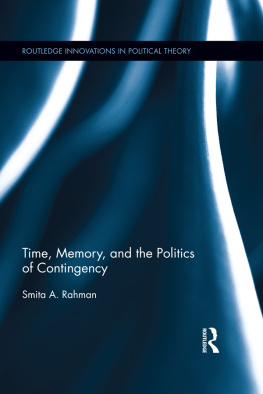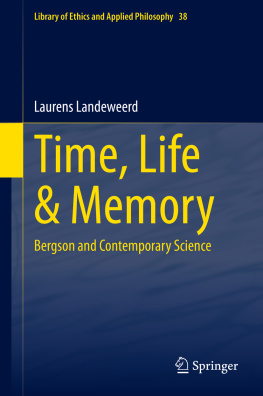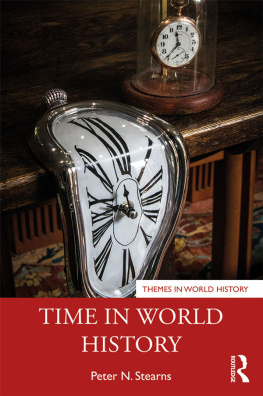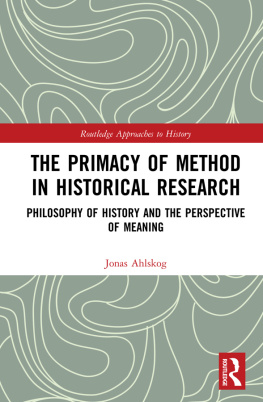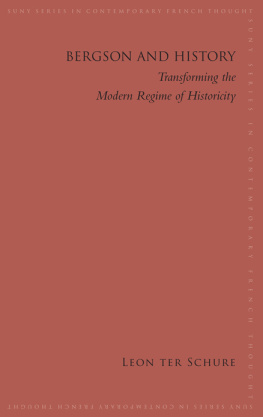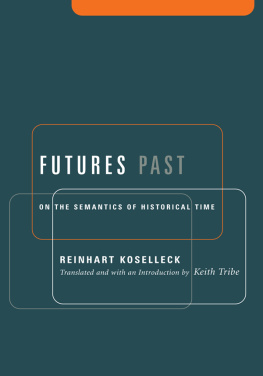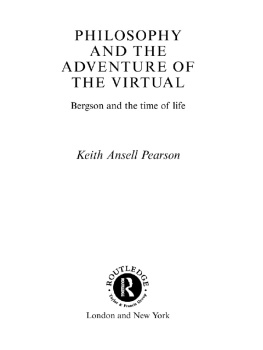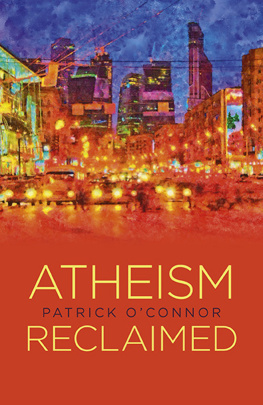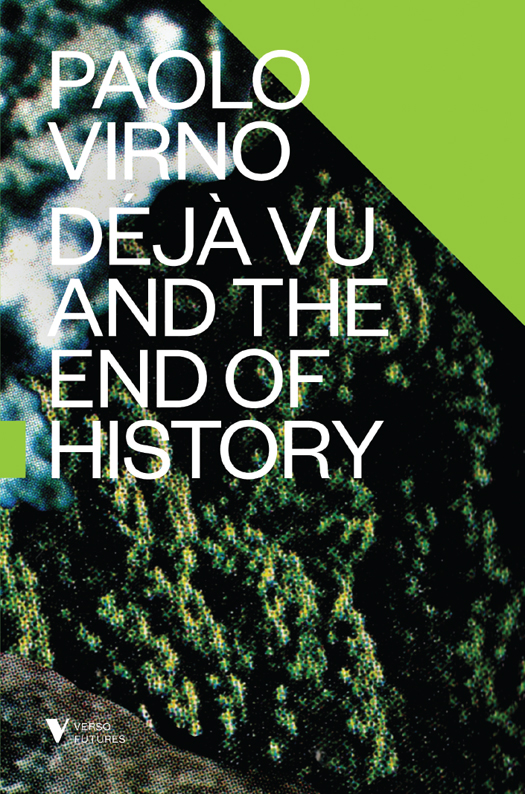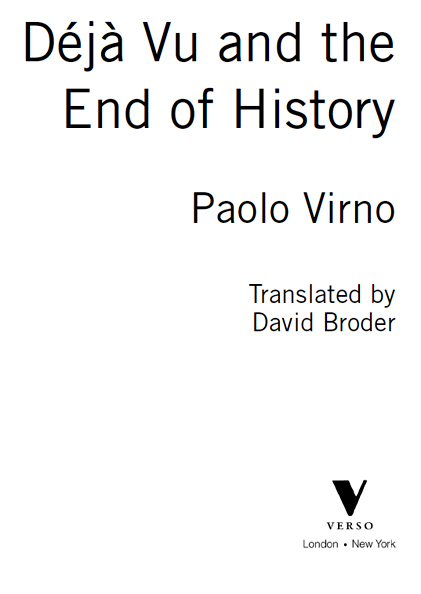Verso Futures is a series of essay-length philosophical and political interventions by both emerging and established writers and thinkers from around the world. Each title in the series addresses the outer limits of political and social possibility.
Part I
Dj vu and the End of History
I returned there
Where I had never been
Nothing has changed from how it wasnt
Giorgio Caproni
Premise
The initial scope of these pages is to test the waters of the relation between the theory of memory and the philosophy of history. The functioning of the mnestic faculty, its performances and pathologies, may perhaps be able to provide us with categories and a lexicon able to give account of historical experience, now that the bordello of historicism (as Walter Benjamin put it, not too tactfully) has pulled up the shutters.
This theme lends itself to a number of ambiguities. We should shake off at least some of these immediately. First off, we are certainly not going to set about comparing the collective past to Prousts Combray, or reducing the challenge of historiography to nibbling on petites madeleines. To miniaturise history, hemming it into the cassock of lived experience, is a miserable fallback solution, one that should be given a wide berth. Such a response is simply the prophylactic measure (or expedient consolation prize) of those who, whatever their recalcitrance, have proven unable to free themselves from the spell of the historicist bordello. Here, instead, we want to trace out a totally different path. Rather than constipate the res gestae and the narration of them within the limits of biographical commemoration, we need to grasp the non-psychological, supra-personal, public significance of the concepts with which we analyse the formation as well as the deterioration of memory.
But what do we mean, when we speak of the supra-personal meaning of mnestic processes? Here a second ambiguity comes into view, opposed to and mirroring the first. It is called historical memory. As we know, this formula is used to designate awareness of events that have taken place and of their lasting influence on actuality. But we are grappling with a misleading metaphor here: we ought instead to speak of historical culture or consciousness, rather than of memory. And yet, mind, it is precisely in order to determine the forms but also the crisis of such consciousness or culture (and, therefore, of this historical memory itself) that it is perhaps necessary for us to turn back to the conceptual constellation pertaining to memory, in the strict sense (the memory with which each person is endowed from infancy). As such, from the outset this ambiguous little formula takes for granted precisely the problem that it poses, one that is still to be answered. Memory is not historical in virtue of the particular content (for example, the social or political content) of memories. Rather, it is historical in that it is that faculty that distinguishes individual existence. Indeed, the structure and processes of this faculty provide an access route to the historicity of experience of any experience, of experience in general. Memory, which is always memory of the particular, however, constitutes a sort of ontogenetic recapitulation of the various modes of being historical, as well as the formal matrix of historiographical categories. Precisely and only
I will give a few examples which are useful in terms of how we look at this problem. Psychiatrists and neurobiologists concerns the very core of all historical thought?
We shall dedicate the following pages, however, to one mnestic phenomenon only: namely, what we call the dj vu. We do this out of the conviction that this specific pathology of memory can cast new light on a canonical theme of historical-philosophical reflection, which is also a pervasive, overbearing state of mind characteristic of the contemporary forms of life. This philosophical theme now also a recklessly advancing mood is the theme of history stopping, or, more radically, the end of history.
1. Watching Themselves Live
When psychiatrists refer to dj vu, they do not mean a known event of the past playing out again, accompanied by either euphoric amazement or bored condescension. Rather, here we have an only apparent repetition, one that is entirely illusory. We believe that we have already experienced (or seen, heard, done, etc.) something that is, in fact, happening for the first time at this very moment. We mistake the current experience for the very faithful copy of an original that never really existed. We believe that we are recognising something of which we are only now cognisant. As such, we could also describe dj vu in terms of false recognition.
Dj vu does not entail a defect of memory, nor its qualitative alteration. Rather, it means the untrammelled extension of memorys jurisdiction, of its dominion. Rather than limit itself to preserving traces of times past, memory also applies itself to actuality, to the evanescent now. The instantaneous present takes the form of memory, and is re-evoked even as it is taking place. But what can remembering the present mean, except having the irresistible sensation of having already experienced it previously? Inasmuch as it is an object of memory, the now is camouflaged as the already-been, and is thus duplicated in an imaginary back then, in a fictitious other-then. It goes without saying that between the
The state of mind correlated to dj vu is that typical of those set on watching themselves live. This means apathy, fatalism, and indifference to a future that seems prescribed even down to the last detail. Since the present is dressed in the clothes of an irrevocable past, these people must renounce any influence on how the present plays out. It is impossible to change something that has taken on the appearances of memory. As such, they give up on action. Or, better, they become spectators of their own actions, almost as if these were part of an already-known and unalterable script. They are dumbfounded spectators, sometimes ironic and often inclined to cynicism. The individual at the mercy of the dj vu is her own epigone. To her eyes, the historical scansion of events is suspended or paralysed; the distinction between before and after, cause and effect, seems futile and even derisory.


